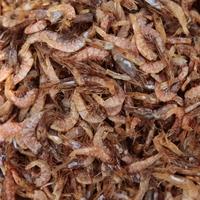More Supply Chain News
Luxury Grocer Erewhon Makes East Coast Debut In NYC
Food Prices In The U.K. Increase Amid Steady Inflation
U.S. Tariffs Disrupt Indian Shrimp Industry
Image Source: Diaa Hadid / NPR
Indian shrimp exports to the U.S. totaled over $2.5 billion from 2023 to 2024. This year, the U.N.'s Food and Agriculture Organization reports extreme declines in Asan shrimp exports. Since 25% tariffs were instated in August, shrimp farm sales across India sank by 90%. As demand slows down, the industry is experiencing the effects. Layoffs are underway in the region, where other types of work are scarce for the average citizen. Over 1 million people work across 450 shrimp hatcheries and 100,000 shrimp farms to fuel the business, while many others are employed by processing plants.

Wholesale Food Prices Climb 4.2% Stoking Fears Of Increased Inflation
Image Source: Shutterstock / RB
According to the U.S. Bureau of Labor Statistics, wholesale food prices have risen 4.2% overall since last year. Wholesale beef prices has gone up nearly 10%, and coffee prices up 29%, over the past year. Prices shot up for fresh and dry vegetables by 38.9% last month alone. Higher wholesale food costs typically lead to higher retail costs at restaurants and grocery stores, and forecasters expect grocers to be hit the hardest by the latest increases. Translation: Brace yourself for increasing food prices, ie. inflation.

More Supply Chain News
USDA To Terminate Thousands Of Federal Union Contracts
Amazon Expands Same-Day Food Delivery Business
More Supply Chain News
Hershey Raises Candy Prices As Cocoa Costs Climb
Tomato Prices Set To Spike After Mexico Trade Deal Expires
Matcha Prices Soar As Producers Struggle To Meet Rising Demand
Image Source: Getty Images / BBC
Japan's post-pandemic tourism boom has made matcha even more popular around the globe. Consumers value its benefits as a lower caffeine alternative to a normal cup of joe. As popularity soars, producers have been struggling to keep cafe shelves stocked with the powdered green tea. US-based tea importer Lauren Purvis says, "some cafes are even asking for a kilo a day. They're desperate to keep up." Crop output has dwindled amid heatwaves and US tariffs on imported goods from Japan, while demand has reached an all-time high. At the Tokyo-based Chazen tea company, matcha prices have risen 30% this year.

A Study On Czechia's Major Struggles With Food Security In Recent Years
Image Source: Anthony Delanoix / Unsplash
A recent study published in the BMC Public Health journal revealed that among respondent 30% of Czechia's population were likely to report food insecurity. Younger folks aged 20 to 34 years old are even more likely to be food insecure, while lower income individuals in the same age range suffer the most. The study analyzed fruit and vegetable intake as well as the varying diets across the country, finding that those with gardens at home and other home food production practices in place often did well. Meanwhile individuals with higher BMI and lower education had 30% higher chances of not having daily access to fruits and vegetables. The sociodemographic-economic factors in the study were sex, age, education, income, number of children and home food production. The results indicated the need for policies that improve financial access to nutritious foods and strengthen the nation's overall food supply.

Hot Climates Put A Strain On Olive Oil Production In Greece, Demand Skyrockets
Image Source: Milada Vigerova / Unsplash
Greece is one of the biggest olive producers in the world, exporting over $1 billion worth of olive oil a year. Over the past year, the country's main agricultural industry has suffered as climates dry up. Present day temperatures are putting a strain on production as olives dry out and farmers are forced to rely on hopeful irrigation techniques. The nation's olive supply has naturally taken a hit, pushing some to begin stealing product. Bloomberg reported that 37 tons of olive oil filled drums were stolen from a mill in the northern region of Greece, Halkidiki. The local growers lost around $300,000 worth of product. Antonopoulos, a member of the Agricultural Cooperative of Kalamata, says he’s far less worried of theft as he is with olive producers fleeing the industry as costs rise. "Many people are abandoning olives," he says, the fields are just "becoming forest."

One Dollar Oyster Promotions Are Vanishing Across The U.S. As Costs Rise
The downfall of the buck-a-shuck is upon us. Food costs overall have been on the rise over recent years, and the world's oyster population has been declining for the past century. Today there are 85 percent less oysters in the world than 100 years ago. Supply has shortened and demand has showed no signs of slowing down. The one dollar deals that diners have grown accustomed to seeing on restaurant menus are typically not profitable for the businesses offering them. “When oysters are costing 90 cents wholesale, once you add the accoutrements, you’re taking a loss," said Kawana Jefferson, owner of Catch, an oyster bar in NYC.
